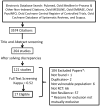Resilience in Vulnerable Populations With Type 2 Diabetes Mellitus and Hypertension: A Systematic Review and Meta-analysis
- PMID: 26239007
- PMCID: PMC4556590
- DOI: 10.1016/j.cjca.2015.06.003
Resilience in Vulnerable Populations With Type 2 Diabetes Mellitus and Hypertension: A Systematic Review and Meta-analysis
Abstract
Background: Patients with chronic conditions and limited access to health care experience stressful challenges resulting from the burden of managing both their conditions and their daily life demands. Resilience provides a mechanism of adapting to stressful experiences. We conducted a systematic review and meta-analysis to synthesize the evidence about interventions to enhance resiliency in managing hypertension or type 2 diabetes in vulnerable populations and to assess the efficacy of these interventions on clinical outcomes.
Methods: We searched multiple databases from early inception through February 2015 including randomized controlled trials that enrolled patients with type 2 diabetes or hypertension. All interventions that targeted resilience in vulnerable populations were included. Data were synthesized to describe the characteristics and efficacy of resiliency interventions. We pooled the total effects by calculating standardized mean difference using the random-effects model.
Results: The final search yielded 17 studies. All studies were conducted in the United States and generally targeted minority participants. Resiliency interventions used diverse strategies; discussion groups or workshops were the most common approach.
Conclusions: Interventions aimed at enhancing the resiliency of patients from vulnerable groups are diverse. Outcomes were not fully conclusive. There was some evidence that resiliency interventions had a positive effect on hemoglobin A1C levels but not blood pressure. The incorporation of resiliency-oriented interventions into the arsenal of preventing and managing chronic conditions appears to be an opportunity that remains to be better investigated and exploited, and there is need to pursue further understanding of the core components of any intervention that claims to enhance resilience.
Copyright © 2015 Canadian Cardiovascular Society. Published by Elsevier Inc. All rights reserved.
Conflict of interest statement
The authors declare that they have no competing interests.
Figures
References
-
- Absetz P, Haukkala A, Uutela A. Socioeconomic status and psychosocial mechanisms of lifestyle change in a type 2 diabetes prevention trial. Annals of Behavioral Medicine. 2009;38:160–5. - PubMed
-
- Gregg J, Callaghan GM, Hayes SC, Glenn-Lawson JL. Improving diabetes self-management through acceptance, mindfulness, and values: a randomized controlled trial. Journal of Consulting & Clinical Psychology. 2007;75:336–43. - PubMed
-
- Norris SL, Engelgau MM, Narayan KM. Effectiveness of self-management training in type 2 diabetes: a systematic review of randomized controlled trials. Diabetes Care. 2001;24:561–87. - PubMed
-
- Bradshaw BG, Richardson GE, Kumpfer K, et al. Determining the efficacy of a resiliency training approach in adults with type 2 diabetes. Diabetes Educ. 2007;33:650–9. - PubMed
Publication types
MeSH terms
Substances
Grants and funding
- R21 TW009982/TW/FIC NIH HHS/United States
- R21TW009982/TW/FIC NIH HHS/United States
- U19 MH098780/MH/NIMH NIH HHS/United States
- HHSN 268200900033C-1-0-1/HL/NHLBI NIH HHS/United States
- WT_/Wellcome Trust/United Kingdom
- U01HL114180/HL/NHLBI NIH HHS/United States
- U19MH098780/MH/NIMH NIH HHS/United States
- 103994/Z/14/Z/WT_/Wellcome Trust/United Kingdom
- MR/M007405/1/MRC_/Medical Research Council/United Kingdom
- HHSN268200900033C/HL/NHLBI NIH HHS/United States
- U01 HL114180/HL/NHLBI NIH HHS/United States
- M007405/MRC_/Medical Research Council/United Kingdom
LinkOut - more resources
Full Text Sources
Other Literature Sources
Medical




